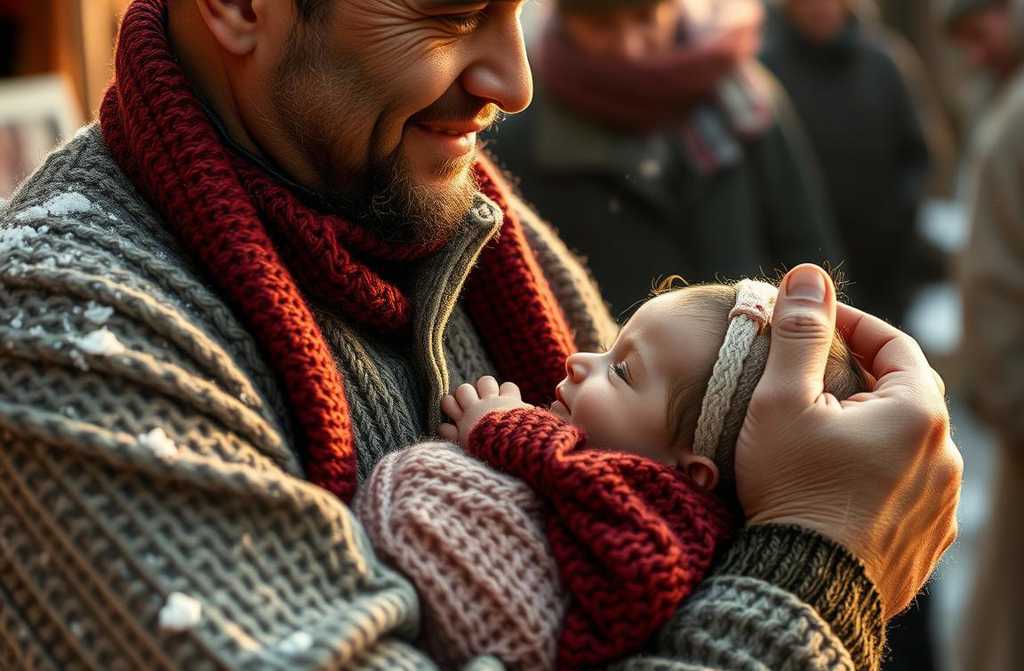**”I Won’t Leave Her”**
The small glass clinked sharply against the worn vinyl tablecloth as Barry slammed it down.
“Youre really not taking her?”
“No, and I wouldnt advise it either,” his sister, Margaret, hissed. “You dont know what its likea newborn. I raised three. Just got them out of nappies, and now you expect me to”
“I wont leave her!” Barrys voice was rough, his grip on the glass tightening.
Hed had too much to drink. The second time since his wife died. The first had been at the funeral.
Lydia hadnt made it through childbirth. At least, not long after. The nursethe one hed given a bar of chocolatehad clattered up the stairs in worn slippers, then returned with the news.
“Its a girl. Big oneeight pounds.”
“A girl?” Barry had grinned, absurdly. Hed wanted a son, hadnt he? All men did. But there he was, smiling like an idiot. “Hows Lydia? When can I see her?”
The nurse had scowled, throwing her hands up. “How should I know? The baby was breech. Theyre saying theres bleeding. Come back tomorrow.”
Bleeding. Hed dismissed it. Something all women dealt with, surely. What did men know of childbirth?
Hed gone back the next evening, after his shift. Walked along the hospital fence under the skeletal acacias, past the rowan trees heavy with red berries, through the bitter scent of autumn. Hed smiled at the windows, wondering if Lydia was watching him.
The bag in his hand wasnt heavy. The lads at the factory had told him what to bring: fresh bread, boiled eggs, apples, grapes. They didnt restrict nursing mothers so much back then.
Hed waited in the corridor, hiding his grease-stained hands in his pockets. The doctor finally came.
“We did everything we could. The bleeding was severe. Complications happen. Im sorry…”
Barry had stared, uncomprehending.
His legs gave out. They gave him water, some kind of drops. He drank obediently, then looked up.
“Shes dead?”
“Yes. My condolences.”
He nodded. Now he understood. The crowd around him made him self-conscious. He stood.
“I should… here, give this to her.” He gestured at the bag. Then, flustered, grabbed it again. “Ill go.”
“Waitthe baby. Well keep her a little longer. Your wifes body will be in the morgue. When will you?”
“The baby?” He hadnt separated the two in his mind. Hed brought one person here. “Shes alive?”
“Yes, healthy. Just… focus on the funeral first.”
“Right. The funeral.” He was lost. “What do I do?”
The truth hit him at home. Grief came in waves, sharp and suffocating.
Lydia… his Lydia.
Hed been born in a village, worked on a farm, unmarried too long. Then his mother died, and hed lived with his sisters familytense, always tired, sharp-tongued.
When the factory in Melling called, hed left. Thats where he met Lydia.
Young, quiet, kind. Raised in care, but she had a grandmother in town. A bitter old woman, worn down by life and her own drunkard daughter. Shed hated Barry at first.
Their homea crumbling annex near the marketwas rotting. The floors sagged, the walls crumbled. No matter how he fixed it, the damp crept back.
Lydia had only come alive with him. After two years, she told him about the home.
“They beat me on the third day. The matron. Dragged me by my hair into a cupboard. Said I needed to learn silence.”
Now Margaret was telling him to send the baby to care.
“Better than you fumbling along!”
He remembered Lydias words: *Never. Never my children.*
The nurse scowled when he came for the baby.
“Your handsfilthy! This isnt a lathe!”
Scrubbing did little until she brought a medical solution. The grime bubbled away.
“Got nappies? Know how to swaddle? Bathe her? Registered with the clinic? Oh, youre hopeless.”
Finally, she handed him the bundle. “Her name?”
“Alexandra. Lydia wanted a boyAlexander.”
“Little Sasha, then.”
The bus ride home was a daze. The baby squirmed in his arms.
“Sir, youll drop her!” a woman scolded.
He clutched her tighter.
At home, he was terrified to unwrap her. When she cried, he panicked. Ran to the clinic. The nurse there took pity, gave him formula.
Days blurred. The baby screamed. He fumbled with nappies, checked her temperature. Maybe care *would* be better.
Then his mates from the factory barged in. Loud, laughing, bearing giftsa pram, clothes, even a knitted blanket.
“From my granddaughter,” said old Tom, the foreman.
When they left, Barry opened the bundle. Nappies, booties, tiny dresses. He hadnt known babies needed so much.
The next morning, he woke clear-headed. The baby slept peacefully. He watched her, really *looked* at her.
His mistake was clear: no routine. He fed her when she cried, kept her swaddled for peace. But life wasnt a latheno steps, no precision.
He tried differently. Played with her, let her kick. She grabbed his finger, cooing.
For the first time since the funeral, he laughed.
“Oh, Sasha! You little rogue!”
Then she soiled her new nappy.
“Couldve warned me!” He chuckled.
At the shops, they let him skip the queue. Word had spreadthe widower raising a girl alone.
One day, clearing drunks from the alley, he thought: *Shell walk to school here.*
But the nursery had no spaces. The council gave him forms, no promises.
Then there was Katherine from payrolldivorced, a widows hunger in her eyes.
“You need a wife,” shed said, lingering.
He couldnt.
One icy morning, he found a boy hiding near the bins. Five years old, shivering.
“Wheres your mum?”
“Market.”
They searched the stalls. The boys motherNinawas a dairy seller, pretty despite her limp.
“You saved him,” she whispered, pressing a jar of warm milk into Barrys hands.
He couldnt stop thinking about her.
When Sasha fell ill, Nina came. Knew just what to do.
“Youre over-wrapping her!”
She stayed.
The drunks catcalled her once. Barry fought them, bruised but triumphant.
Later, in the quiet house, Nina teased him.
“Not much of a catcha cripple and a single mother.”
He kissed her.
From the bedroom, the boys voice piped up:
“Mum! Sasha did a *massive* poop! Do girls always do that?”
They laughed.
The children would grow up together. That much was certain.







